Nature系列期刊投稿指南
最新Nature投稿格式指南

This guide describes how to prepare contributions for submission. We recommend you read this in full if you have not previously submitted a contribution to Nature. We also recommend that, before submission, you familiarize yourself with Nature‟s style and content by reading the journal, either in print or online, particularly if you have not submitted to the journal recently.Table of contents∙ 1. Formats for Nature contributions Nature文稿格式o 1.1 Articles文章o 1.2 Letters快报o 1.3 Brief Communications Arising and Corrections通信与校正o 1.4 Other types of submission其他∙ 2. The editorial process编辑处理过程∙ 3. Presubmission enquiries投稿前询问∙ 4. Readability易读性∙ 5. Format of Articles and Letters格式o 5.1 Titles标题o 5.2 Text正文o 5.3 Methods方法o 5.4 References引文o 5.5 End notes尾注o 5.6 Statistics统计资料o 5.7 Tables表格o 5.8 Figure legends插图说明o 5.9 Figures插图o 5.10 Production quality figures高质量插图o 5.11 Supplementary information附件信息o 5.12 Chemical structures and characterization ofchemical materials化学结构∙ 6. Submission提交∙7. Publishing in other Nature and NPG journals出版Parts of this document are summarized in a downloadable information sheet.1. Formats for Nature contributions:Nature文稿格式Nature's main formats for original research are Articles and Letters. In addition, Nature publishes other submitted material as detailed below (Section 1.4)."来信"(Letters to Nature)是对某一原始科研成果的初步介绍,其内容是其他领域的研究人员所感兴趣的。
nature cell biology的投稿须知

nature cell biology的投稿须知
“Nature Cell Biology的投稿须知”是指《Nature Cell Biology》杂志对作者投稿的相关要求和规定。
《Nature Cell Biology》是一本国际知名的细胞生物学学术期刊,由自然研究出版社(Nature Research)出版。
该期刊旨在发表高质量的原创研究论文,涵盖细胞生物学领域的各个方面,包括细胞结构、功能、信号转导、基因表达调控等。
以下是《Nature Cell Biology》的投稿须知中的一些要点:
1.研究论文应具有原创性,未在其他期刊上发表过,并且符合期刊的宗旨和
范围。
2.研究论文应提供充分的实验数据支持结论,并且实验方法和技术应详细描
述。
3.研究论文应包含引言、实验方法、结果和讨论等部分,并且应遵循规定的
格式和写作风格。
4.作者应确保论文中没有抄袭、剽窃或其他违反学术道德的行为。
5.作者应尊重知识产权,确保论文中未侵犯任何专利权或其他知识产权。
6.作者应遵守相关的伦理标准,确保实验动物和人类受试者的权益得到保护。
7.作者应支付相应的出版费用。
需要注意的是,具体的投稿须知可能会随着时间和期刊政策的变化而有所不同。
因此,作者在投稿前应仔细阅读《Nature Cell Biology》的官方网站或联系期刊编辑部,以确保了解最新的投稿要求和规定。
Nature投稿指南

在Nature杂志上发表科学论文的准则是:.报道原始科学研究(主要成果和结论不得在其它地方发表过或投过稿,请见后面的“投稿指南”).具有突出的科学重要性.令有关的学科读者感兴趣。
在Nature杂志上发表的论文在科学家之中和在一般大众中具有极广泛的影响。
谁决定哪篇论文能发表Nature杂志对每周所投来的170篇论文只能发表其中的10%左右,因此其选稿标准是极其严格的。
对于哪篇论文能使广大读者感兴趣的评判,是由Nature杂志的编辑,而不是审稿员作出的。
原因之一是,每位审稿员只能读到所投来稿件中的很小一部分,而编辑却能看到所有的来稿,就能具有更宽阔的视野。
Nature杂志并未聘用一个由资深科学家组成的编辑委员会也不隶属于任何特定的科学学会或科学机构,因此它避免了某些编辑委员会成员因学术观点或种族偏见在决定取舍时受到影响,也缩短了作出决定所需的时间。
由于Nature杂志的编辑有权决定发表哪篇论文,因此决定取舍就较快,在学科之间较公平,这些决定也不受外来干扰。
一篇来稿的编辑过程有意向Nature杂志投稿的作者首先须参考“投稿指南”,这可以很容易地从 以PDF格式读取或直接向Nature杂志索取。
遵照这一“投稿指南”将保证来稿的水平、长度和格式(特别是图片和表格的编排)能符合Nature杂志的要求,也将减少处理来稿时所需的时间。
来稿不但需要5份拷贝,还应提交已在其他地方发表过的或与所投稿件相关的论文。
1.对一篇新投稿的论文的第一道关卡是编辑部面员判断该论文能否引起广泛兴趣而是否需送交同行评议。
这一决定主要是由对此课题最了解的编辑作出,但还要向特约科学顾问(通过电话或电子邮件)征求非正式咨询,并在几位编辑部同仁之间就该论文进行讨论以取得一致意见。
所以最好随该论文附有一封自荐信,简要说明作者为何认为该论文适于在Nature 杂志发表而不应在该领域的某种优秀专业杂志上发表。
把一篇论文送交同行评议的初始标准是科研成果新颖、引入注意(出入意料或令人吃惊),而且该项研究看来在该领域之外具有广泛的意义。
怎样在_自然_杂志上发表文章
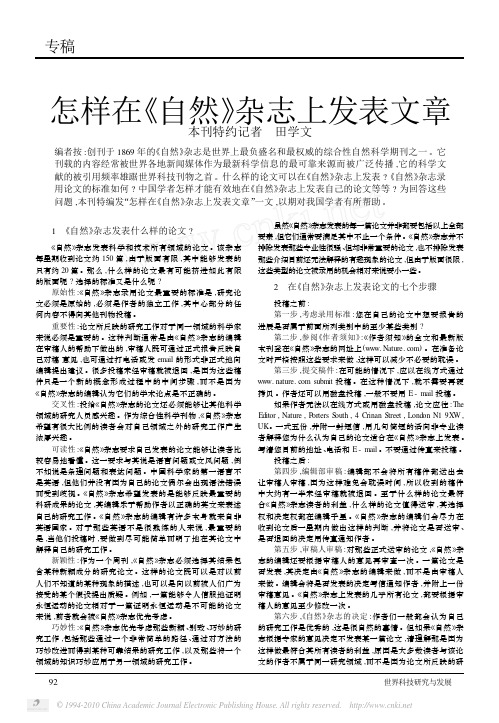
怎样在《自然》杂志上发表文章本刊特约记者 田学文编者按:创刊于1869年的《自然》杂志是世界上最负盛名和最权威的综合性自然科学期刊之一。
它刊载的内容经常被世界各地新闻媒体作为最新科学信息的最可靠来源而被广泛传播,它的科学文献的被引用频率雄踞世界科技刊物之首。
什么样的论文可以在《自然》杂志上发表?《自然》杂志录用论文的标准如何?中国学者怎样才能有效地在《自然》杂志上发表自己的论文等等?为回答这些问题,本刊特编发“怎样在《自然》杂志上发表文章”一文,以期对我国学者有所帮助。
1 《自然》杂志发表什么样的论文?《自然》杂志发表科学和技术所有领域的论文。
该杂志每星期收到论文约150篇,由于版面有限,其中能够发表的只有约20篇。
那么,什么样的论文最有可能挤进如此有限的版面呢?选择的标准又是什么呢?原始性:《自然》杂志录用论文最重要的标准是,研究论文必须是原始的,必须是作者的独立工作,其中心部分的任何内容不得向其他刊物投稿。
重要性:论文所反映的研究工作对于同一领域的科学家来说必须是重要的。
这种判断通常是由《自然》杂志的编辑在审稿人的帮助下做出的,审稿人既可通过正式报告反映自己对稿意见,也可通过打电话或发email的形式非正式地向编辑提出建议。
很多投稿未经审稿就被退回,是因为这些稿件只是一个新的概念形成过程中的中间步骤,而不是因为《自然》杂志的编辑认为它们的学术论点是不正确的。
交叉性:投给《自然》杂志的论文还必须能够让其他科学领域的研究人员感兴趣。
作为综合性科学刊物,《自然》杂志希望有很大比例的读者会对自己领域之外的研究工作产生浓厚兴趣。
可读性:《自然》杂志要求自己发表的论文能够让读者比较容易地看懂。
这一要求与其说是语言问题或文风问题,倒不如说是条理问题和表达问题。
中国科学家的第一语言不是英语,但他们并没有因为自己的论文偶尔会出现语法错误而受到歧视。
《自然》杂志希望发表的是能够反映最重要的科研成果的论文,其编辑乐于帮助作者以正确的英文来表述自己的研究工作。
如何在《Nature》杂志上发表论文
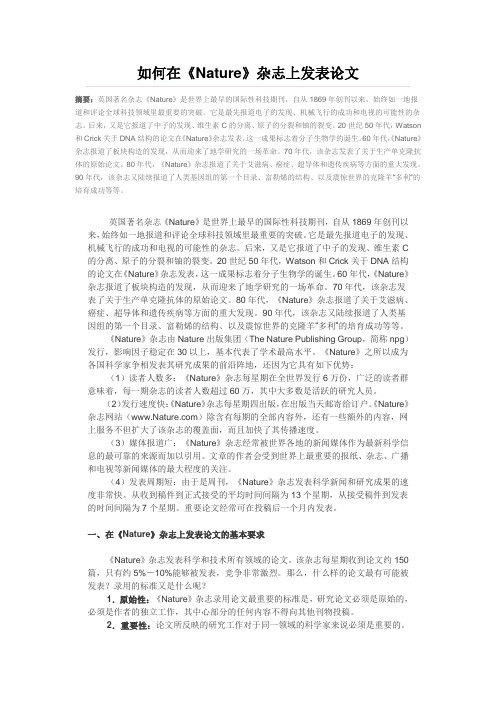
摘要:英国著名杂志《Nature》是世界上最早的国际性科技期刊,自从1869年创刊以来,始终如一地报道和评论全球科技领域里最重要的突破。
它是最先报道电子的发现、机械飞行的成功和电视的可能性的杂志。
后来,又是它报道了中子的发现、维生素C的分离、原子的分裂和铀的裂变。
20世纪50年代,Watson《Nature》和Crick关于DNA结构的论文在《Nature》杂志发表,这一成果标志着分子生物学的诞生。
60年代,杂志报道了板块构造的发现,从而迎来了地学研究的一场革命。
70年代,该杂志发表了关于生产单克隆抗体的原始论文。
80年代,《Nature》杂志报道了关于艾滋病、癌症、超导体和遗传疾病等方面的重大发现。
90年代,该杂志又陆续报道了人类基因组的第一个目录、富勒烯的结构、以及震惊世界的克隆羊“多利”的培育成功等等。
英国著名杂志《Nature》是世界上最早的国际性科技期刊,自从1869年创刊以来,始终如一地报道和评论全球科技领域里最重要的突破。
它是最先报道电子的发现、机械飞行的成功和电视的可能性的杂志。
后来,又是它报道了中子的发现、维生素C 的分离、原子的分裂和铀的裂变。
20世纪50年代,Watson和Crick关于DNA结构的论文在《Nature》杂志发表,这一成果标志着分子生物学的诞生。
60年代,《Nature》杂志报道了板块构造的发现,从而迎来了地学研究的一场革命。
70年代,该杂志发表了关于生产单克隆抗体的原始论文。
80年代,《Nature》杂志报道了关于艾滋病、癌症、超导体和遗传疾病等方面的重大发现。
90年代,该杂志又陆续报道了人类基因组的第一个目录、富勒烯的结构、以及震惊世界的克隆羊“多利”的培育成功等等。
《Nature》杂志由Nature出版集团(The Nature Publishing Group,简称npg)发行,影响因子稳定在30以上,基本代表了学术最高水平。
《Nature》之所以成为各国科学家争相发表其研究成果的前沿阵地,还因为它具有如下优势:(1)读者人数多:《Nature》杂志每星期在全世界发行6万份,广泛的读者群意味着,每一期杂志的读者人数超过60万,其中大多数是活跃的研究人员。
如何在nature上发表文章
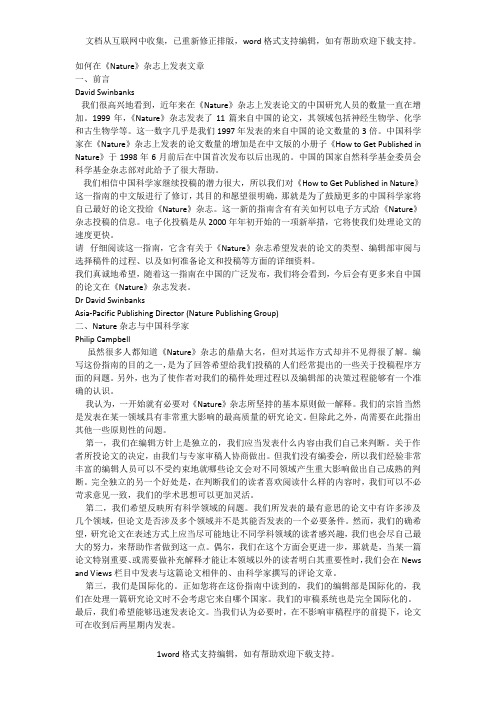
如何在《Nature》杂志上发表文章一、前言David Swinbanks我们很高兴地看到,近年来在《Nature》杂志上发表论文的中国研究人员的数量一直在增加。
1999年,《Nature》杂志发表了11篇来自中国的论文,其领域包括神经生物学、化学和古生物学等。
这一数字几乎是我们1997年发表的来自中国的论文数量的3倍。
中国科学家在《Nature》杂志上发表的论文数量的增加是在中文版的小册子《How to Get Published in Nature》于1998年6月前后在中国首次发布以后出现的。
中国的国家自然科学基金委员会科学基金杂志部对此给予了很大帮助。
我们相信中国科学家继续投稿的潜力很大,所以我们对《How to Get Published in Nature》这一指南的中文版进行了修订,其目的和愿望很明确,那就是为了鼓励更多的中国科学家将自己最好的论文投给《Nature》杂志。
这一新的指南含有有关如何以电子方式给《Nature》杂志投稿的信息。
电子化投稿是从2000年年初开始的一项新举措,它将使我们处理论文的速度更快。
请仔细阅读这一指南,它含有关于《Nature》杂志希望发表的论文的类型、编辑部审阅与选择稿件的过程、以及如何准备论文和投稿等方面的详细资料。
我们真诚地希望,随着这一指南在中国的广泛发布,我们将会看到,今后会有更多来自中国的论文在《Nature》杂志发表。
Dr David SwinbanksAsia-Pacific Publishing Director (Nature Publishing Group)二、Nature杂志与中国科学家Philip Campbell虽然很多人都知道《Nature》杂志的鼎鼎大名,但对其运作方式却并不见得很了解。
编写这份指南的目的之一,是为了回答希望给我们投稿的人们经常提出的一些关于投稿程序方面的问题。
另外,也为了使作者对我们的稿件处理过程以及编辑部的决策过程能够有一个准确的认识。
Nature杂志投稿指南
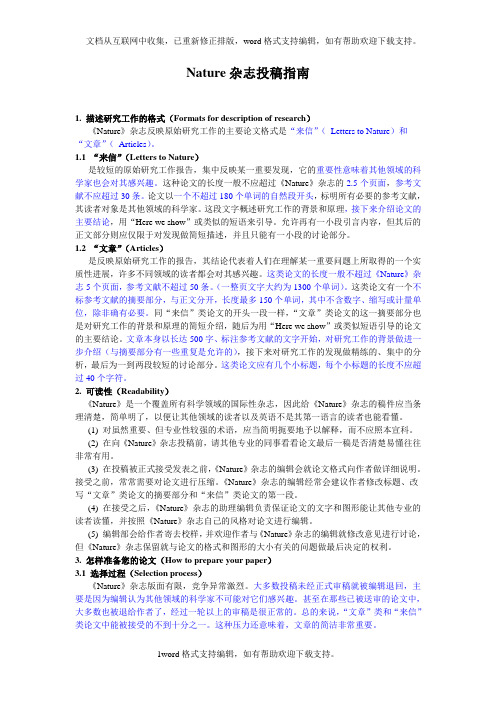
Nature杂志投稿指南1. 描述研究工作的格式(Formats for description of research)《Nature》杂志反映原始研究工作的主要论文格式是“来信”(Letters to Nature)和“文章”(Articles)。
1.1 “来信”(Letters to Nature)是较短的原始研究工作报告,集中反映某一重要发现,它的重要性意味着其他领域的科学家也会对其感兴趣。
这种论文的长度一般不应超过《Nature》杂志的2.5个页面,参考文献不应超过30条。
论文以一个不超过180个单词的自然段开头,标明所有必要的参考文献,其读者对象是其他领域的科学家。
这段文字概述研究工作的背景和原理,接下来介绍论文的主要结论,用“Here we show”或类似的短语来引导。
允许再有一小段引言内容,但其后的正文部分则应仅限于对发现做简短描述,并且只能有一小段的讨论部分。
1.2 “文章”(Articles)是反映原始研究工作的报告,其结论代表着人们在理解某一重要问题上所取得的一个实质性进展,许多不同领域的读者都会对其感兴趣。
这类论文的长度一般不超过《Nature》杂志5个页面,参考文献不超过50条。
(一整页文字大约为1300个单词)。
这类论文有一个不标参考文献的摘要部分,与正文分开,长度最多150个单词,其中不含数字、缩写或计量单位,除非确有必要。
同“来信”类论文的开头一段一样,“文章”类论文的这一摘要部分也是对研究工作的背景和原理的简短介绍,随后为用“Here we show”或类似短语引导的论文的主要结论。
文章本身以长达500字、标注参考文献的文字开始,对研究工作的背景做进一步介绍(与摘要部分有一些重复是允许的),接下来对研究工作的发现做精练的、集中的分析,最后为一到两段较短的讨论部分。
这类论文应有几个小标题,每个小标题的长度不应超过40个字符。
2. 可读性(Readability)《Nature》是一个覆盖所有科学领域的国际性杂志,因此给《Nature》杂志的稿件应当条理清楚,简单明了,以便让其他领域的读者以及英语不是其第一语言的读者也能看懂。
nature投稿经历
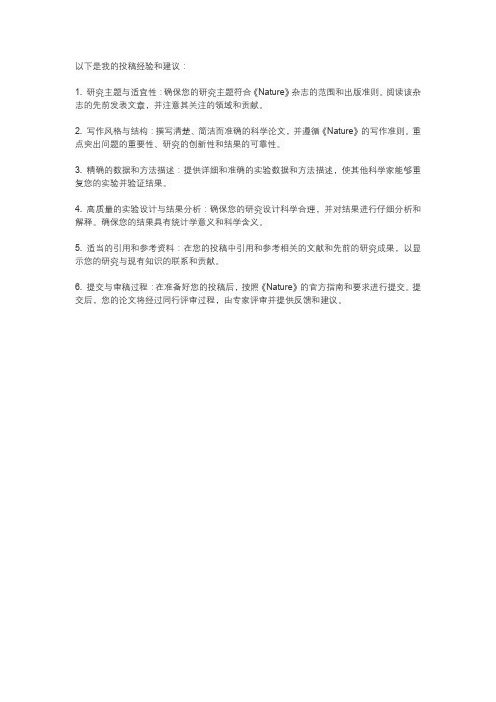
以下是我的投稿经验和建议:
1. 研究主题与适宜性:确保您的研究主题符合《Nature》杂志的范围和出版准则。
阅读该杂志的先前发表文章,并注意其关注的领域和贡献。
2. 写作风格与结构:撰写清楚、简洁而准确的科学论文,并遵循《Nature》的写作准则。
重点突出问题的重要性、研究的创新性和结果的可靠性。
3. 精确的数据和方法描述:提供详细和准确的实验数据和方法描述,使其他科学家能够重复您的实验并验证结果。
4. 高质量的实验设计与结果分析:确保您的研究设计科学合理,并对结果进行仔细分析和解释。
确保您的结果具有统计学意义和科学含义。
5. 适当的引用和参考资料:在您的投稿中引用和参考相关的文献和先前的研究成果,以显示您的研究与现有知识的联系和贡献。
6. 提交与审稿过程:在准备好您的投稿后,按照《Nature》的官方指南和要求进行提交。
提交后,您的论文将经过同行评审过程,由专家评审并提供反馈和建议。
nature energy投稿经验

nature energy投稿经验(原创实用版)目录1.引言:介绍 Nature Energy 期刊的基本信息2.投稿准备:阐述投稿前需要做的准备工作3.投稿过程:详述投稿的具体步骤和注意事项4.审稿流程:介绍审稿的各个阶段和可能的结果5.修改和接受:说明接收到审稿意见后需要进行的修改和接受过程6.总结:分享投稿经验和建议正文ature Energy 是一本关注能源领域前沿研究和创新的国际性学术期刊,旨在发表高质量的研究论文、评论和新闻报道。
对于有志于在能源领域发表研究的学者来说,向 Nature Energy 投稿是一个很好的选择。
在本文中,我们将分享一些 Nature Energy 投稿的经验和建议。
在投稿前,首先要做好充足的准备工作。
这包括选择合适的研究主题,确保论文质量达到期刊要求,以及寻找合适的同行进行审稿。
在选择研究主题时,要关注能源领域的前沿和热点问题,同时确保研究具有创新性和实际意义。
在撰写论文时,要遵循 Nature Energy 的格式要求,确保论文结构清晰、论述严谨。
此外,选择合适的同行进行审稿也非常重要,他们应该具备相关领域的专业知识和丰富的研究经验。
投稿过程分为几个步骤。
首先,需要在 Nature Energy 的官方网站上注册一个账号,然后按照系统提示填写投稿信息。
在提交论文之前,需要确认论文的格式、语言和图表等都符合期刊要求。
同时,要确保已为论文选择适当的作者和审稿人。
在提交论文后,系统会自动生成一个投稿编号,用于后续的查询和沟通。
审稿流程通常包括以下几个阶段:编辑初审、审稿人评审、作者修改和编辑终审。
编辑初审阶段,期刊编辑会对论文进行初步评估,判断论文是否符合期刊的投稿要求。
如果通过初审,论文将被送交给审稿人进行评审。
审稿人评审阶段,审稿人会对论文进行详细的评估,提出意见和建议。
作者需要根据审稿意见进行修改,并提交修改后的论文。
编辑终审阶段,编辑会再次审查论文,确认论文质量和修改情况,最终决定是否接受论文。
Nature系列期刊投稿指南
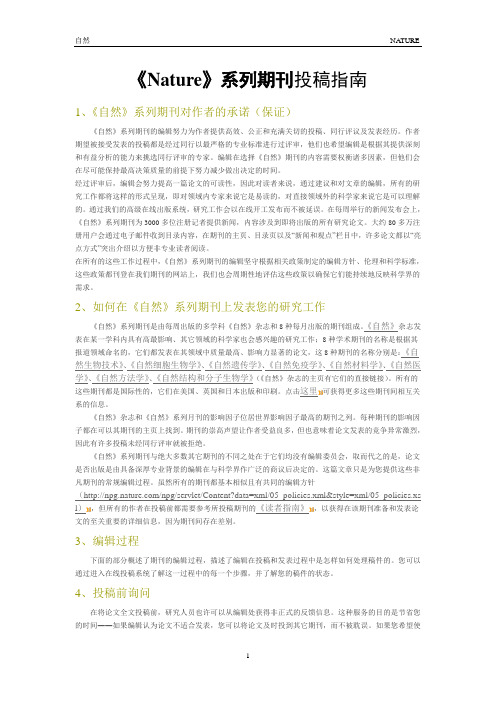
《Nature》系列期刊投稿指南1、《自然》系列期刊对作者的承诺(保证)《自然》系列期刊的编辑努力为作者提供高效、公正和充满关切的投稿、同行评议及发表经历。
作者期望被接受发表的投稿都是经过同行以最严格的专业标准进行过评审,他们也希望编辑是根据其提供深刻和有益分析的能力来挑选同行评审的专家。
编辑在选择《自然》期刊的内容需要权衡诸多因素,但他们会在尽可能保持最高决策质量的前提下努力减少做出决定的时间。
经过评审后,编辑会努力提高一篇论文的可读性,因此对读者来说,通过建议和对文章的编辑,所有的研究工作都将这样的形式呈现,即对领域内专家来说它是易读的,对直接领域外的科学家来说它是可以理解的。
通过我们的高级在线出版系统,研究工作会以在线开工发布而不被延误。
在每周举行的新闻发布会上,《自然》系列期刊为3000多位注册记者提供新闻,内容涉及到即将出版的所有研究论文。
大约80多万注册用户会通过电子邮件收到目录内容,在期刊的主页、目录页以及“新闻和观点”栏目中,许多论文都以“亮点方式”突出介绍以方便非专业读者阅读。
在所有的这些工作过程中,《自然》系列期刊的编辑坚守根据相关政策制定的编辑方针、伦理和科学标准,这些政策都刊登在我们期刊的网站上,我们也会周期性地评估这些政策以确保它们能持续地反映科学界的需求。
2、如何在《自然》系列期刊上发表您的研究工作《自然》系列期刊是由每周出版的多学科《自然》杂志和8种每月出版的期刊组成。
《自然》杂志发表在某一学科内具有高最影响、其它领域的科学家也会感兴趣的研究工作;8种学术期刊的名称是根据其报道领域命名的,它们都发表在其领域中质量最高、影响力显著的论文,这8种期刊的名称分别是:《自然生物技术》、《自然细胞生物学》、《自然遗传学》、《自然免疫学》、《自然材料学》、《自然医学》、《自然方法学》、《自然结构和分子生物学》(《自然》杂志的主页有它们的直接链接)。
所有的这些期刊都是国际性的,它们在美国、英国和日本出版和印刷。
nature biomedical engineering 投稿经验

nature biomedical engineering 投稿经验摘要:1.Nature Biomedical Engineering 期刊简介2.投稿经验分享3.撰写文章的注意事项4.投稿过程中的问题与解决方法5.结论正文:【Nature Biomedical Engineering 期刊简介】ature Biomedical Engineering 是一本由Nature 出版集团发行的高质量生物医学工程领域的学术期刊。
该期刊旨在促进生物医学工程领域的创新研究,包括但不限于生物材料、纳米技术、组织工程、再生医学、生物信息学等方面的研究。
Nature Biomedical Engineering 是一本国际性期刊,欢迎全球范围内的学者投稿。
【投稿经验分享】1.了解期刊要求在投稿之前,作者需要详细阅读期刊的投稿指南,了解期刊的投稿要求、审稿流程、文章格式等方面的要求。
Nature Biomedical Engineering 要求投稿的文章必须具有原创性、创新性和学术价值。
2.明确文章定位在投稿之前,作者需要明确自己的文章定位,确保文章适合期刊的发表范围。
Nature Biomedical Engineering 主要接收生物医学工程领域的原创研究论文、综述文章、新闻与观点等类型的文章。
3.注重文章质量ature Biomedical Engineering 对文章的质量要求非常高,因此作者在撰写文章时需要确保文章的质量。
这包括数据的可靠性、实验设计的合理性、论文结构的清晰性等方面。
4.选择合适的审稿人在投稿过程中,作者可以选择合适的审稿人。
选择熟悉自己研究领域的审稿人,可以提高文章被接受的几率。
【撰写文章的注意事项】1.确保文章结构的清晰性文章的结构应该清晰明了,便于审稿人和读者理解。
一般来说,文章应该包括引言、背景、方法、结果、讨论和结论等部分。
2.遵循期刊的格式要求ature Biomedical Engineering 对文章的格式有严格的要求,作者在投稿之前需要仔细阅读期刊的格式要求,并按照要求进行排版。
怎样在《Nature》杂志上发表论文

怎样在《Nature》杂志上发表论文发表论文在学术界被认为是一个重要的里程碑,特别是在备受推崇的科学期刊《Nature》上发表。
在这篇文章中,我将分享一些关于如何在《Nature》杂志上发表论文的指导原则和步骤。
首先,了解《Nature》杂志。
《Nature》是一本国际知名的综合性科学杂志,涵盖了生物学、物理学、化学、地球科学以及其他自然科学领域的各个方面。
在投稿之前,你应该充分了解该杂志的投稿范围、主题以及发表标准。
仔细研究该杂志的最新期刊,详细查阅它过去发表的论文,了解其对创新性、学术质量和对科学界的影响力的要求。
其次,选择合适的主题。
选择一个重要、创新以及具有广泛影响力的研究课题是成功发表在《Nature》杂志上的重要条件。
主题应该涉及到当前的科学热点问题,具有前瞻性以及重要的解决方案。
仔细审视你的研究领域,确定一个具有独特性和重要性的主题。
第三,把握好故事的结构。
在撰写论文时,你应该有一个明确的故事结构,并紧密围绕主题展开论述。
一篇发表在《Nature》上的论文通常具有清晰的研究问题,详细的实验设计和方法论,以及具有重要发现或创新性见解的结果和讨论。
要以简洁、条理清晰、逻辑严密的方式来撰写论文,使读者能够明确你的研究目标、设计和结论。
第四,重视数据分析和实验验证。
数据的准确性和分析的可靠性是在《Nature》上发表论文的至关重要的要素。
确保所有数据的实验都得到了充分的验证和重复,并应用统计学方法进行数据分析和解释。
同时,你还应该仔细评估你的实验设计和方法是否严谨,细致地检查结果和结论的可靠性和合理性。
第五,注意语言和写作风格。
在撰写论文时,你应该尽量简洁、准确地表达你的研究目标和发现。
使用清晰、科学的语言,避免使用过于复杂的术语和句子结构。
此外,你还应该注意论文的逻辑和结构,并确保各部分之间的连接紧密、流畅。
第六,选择合适的杂志部分。
《Nature》杂志有多个专题部分,如Letters、Research Highlights、News & Views等。
Nature投稿指南

欢迎访问大连化物所图书档案信息中心!回到首页Nature杂志投稿指南 1. 描述研究工作的格式(Formats for description of research) 《Nature》杂志反映原始研究工作的主要论文格式是“来信”( Letters to Nature)和“文章”( Articles)。
1.1 “来信”(Letters to Nature) 是较短的原始研究工作报告,集中反映某一重要发现,它的重要性意味着其他领域的科学家也会对其感兴趣。
这种论文的长度一般不应超过《Nature》杂志的2.5个页面,参考文献不应超过30条。
论文以一个不超过180个单词的自然段开头,标明所有必要的参考文献,其读者对象是其他领域的科学家。
这段文字概述研究工作的背景和原理,接下来介绍论文的主要结论,用“Here we show”或类似的短语来引导。
允许再有一小段引言内容,但其后的正文部分则应仅限于对发现做简短描述,并且只能有一小段的讨论部分。
1.2 “文章”(Articles) 是反映原始研究工作的报告,其结论代表着人们在理解某一重要问题上所取得的一个实质性进展,许多不同领域的读者都会对其感兴趣。
这类论文的长度一般不超过《Nature》杂志5个页面,参考文献不超过50条。
(一整页文字大约为1300个单词)。
这类论文有一个不标参考文献的摘要部分,与正文分开,长度最多150个单词,其中不含数字、缩写或计量单位,除非确有必要。
同“来信”类论文的开头一段一样,“文章”类论文的这一摘要部分也是对研究工作的背景和原理的简短介绍,随后为用“Here we show”或类似短语引导的论文的主要结论。
文章本身以长达500字、标注参考文献的文字开始,对研究工作的背景做进一步介绍(与摘要部分有一些重复是允许的),接下来对研究工作的发现做精练的、集中的分析,最后为一到两段较短的讨论部分。
这类论文应有几个小标题,每个小标题的长度不应超过40个字符。
NATURE投稿指南
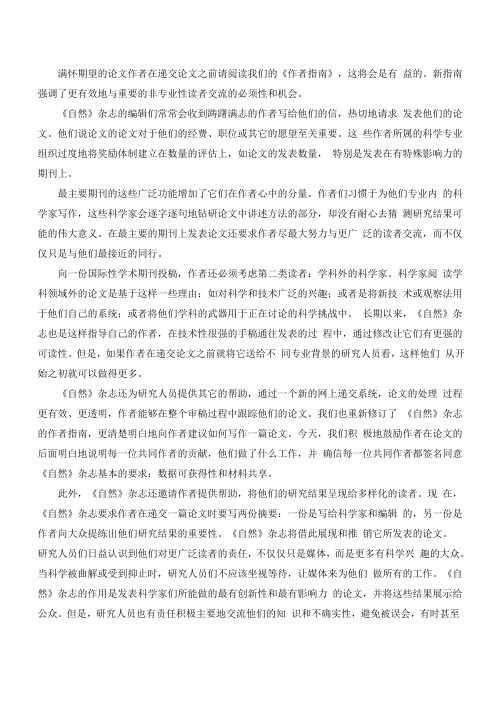
满怀期望的论文作者在递交论文之前请阅读我们的《作者指南》,这将会是有益的。
新指南强调了更有效地与重要的非专业性读者交流的必须性和机会。
《自然》杂志的编辑们常常会收到踌躇满志的作者写给他们的信,热切地请求发表他们的论文。
他们说论文的论文对于他们的经费、职位或其它的愿望至关重要。
这些作者所属的科学专业组织过度地将奖励体制建立在数量的评估上,如论文的发表数量,特别是发表在有特殊影响力的期刊上。
最主要期刊的这些广泛功能增加了它们在作者心中的分量。
作者们习惯于为他们专业内的科学家写作,这些科学家会逐字逐句地钻研论文中讲述方法的部分,却没有耐心去猜测研究结果可能的伟大意义。
在最主要的期刊上发表论文还要求作者尽最大努力与更广泛的读者交流,而不仅仅只是与他们最接近的同行。
向一份国际性学术期刊投稿,作者还必须考虑第二类读者:学科外的科学家。
科学家阅读学科领域外的论文是基于这样一些理由:如对科学和技术广泛的兴趣;或者是将新技术或观察法用于他们自己的系统;或者将他们学科的武器用于正在讨论的科学挑战中。
长期以来,《自然》杂志也是这样指导自己的作者,在技术性很强的手稿通往发表的过程中,通过修改让它们有更强的可读性。
但是,如果作者在递交论文之前就将它送给不同专业背景的研究人员看,这样他们从开始之初就可以做得更多。
《自然》杂志还为研究人员提供其它的帮助,通过一个新的网上递交系统,论文的处理过程更有效、更透明,作者能够在整个审稿过程中跟踪他们的论文。
我们也重新修订了《自然》杂志的作者指南,更清楚明白地向作者建议如何写作一篇论文。
今天,我们积极地鼓励作者在论文的后面明白地说明每一位共同作者的贡献,他们做了什么工作,并确信每一位共同作者都签名同意《自然》杂志基本的要求:数据可获得性和材料共享。
此外,《自然》杂志还邀请作者提供帮助,将他们的研究结果呈现给多样化的读者。
现在,《自然》杂志要求作者在递交一篇论文时要写两份摘要:一份是写给科学家和编辑的,另一份是作者向大众提练出他们研究结果的重要性。
science和nature发表文章的流程

《Nature》系列期刊投稿指南1、《自然》系列期刊对作者的承诺(保证)《自然》系列期刊的编辑努力为作者提供高效、公正和充满关切的投稿、同行评议及发表经历。
作者期望被接受发表的投稿都是经过同行以最严格的专业标准进行过评审,他们也希望编辑是根据其提供深刻和有益分析的能力来挑选同行评审的专家。
编辑在选择《自然》期刊的内容需要权衡诸多因素,但他们会在尽可能保持最高决策质量的前提下努力减少做出决定的时间。
经过评审后,编辑会努力提高一篇论文的可读性,因此对读者来说,通过建议和对文章的编辑,所有的研究工作都将这样的形式呈现,即对领域内专家来说它是易读的,对直接领域外的科学家来说它是可以理解的。
通过我们的高级在线出版系统,研究工作会以在线开工发布而不被延误。
在每周举行的新闻发布会上,《自然》系列期刊为3000多位注册记者提供新闻,内容涉及到即将出版的所有研究论文。
大约80多万注册用户会通过电子邮件收到目录内容,在期刊的主页、目录页以及“新闻和观点”栏目中,许多论文都以“亮点方式”突出介绍以方便非专业读者阅读。
在所有的这些工作过程中,《自然》系列期刊的编辑坚守根据相关政策制定的编辑方针、伦理和科学标准,这些政策都刊登在我们期刊的网站上,我们也会周期性地评估这些政策以确保它们能持续地反映科学界的需求。
2、如何在《自然》系列期刊上发表您的研究工作《自然》系列期刊是由每周出版的多学科《自然》杂志和8种每月出版的期刊组成。
《自然》杂志发表在某一学科内具有高最影响、其它领域的科学家也会感兴趣的研究工作;8种学术期刊的名称是根据其报道领域命名的,它们都发表在其领域中质量最高、影响力显著的论文,这8种期刊的名称分别是:《自然生物技术》、《自然细胞生物学》、《自然遗传学》、《自然免疫学》、《自然材料学》、《自然医学》、《自然方法学》、《自然结构和分子生物学》(《自然》杂志的主页有它们的直接链接)。
所有的这些期刊都是国际性的,它们在美国、英国和日本出版和印刷。
nature杂志的投稿流程

Nature杂志的投稿流程一般包括以下步骤:
注册和创建账户:在投稿之前,作者需要在Nature杂志的网站上注册并创建一个账户。
这个账户将被用于管理稿件、查看审稿状态以及接收编辑部的反馈。
提交稿件:在准备就绪后,作者可以开始提交稿件。
在Nature杂志的网站上,作者可以选择要投稿的期刊,然后上传稿件。
在上传稿件时,作者需要提供一些基本信息,例如论文标题、作者信息、摘要等。
编辑稿件:在提交稿件后,编辑部将对稿件进行初步审查。
如果稿件符合期刊的要求,编辑部会邀请作者进行进一步的修改和润色。
这个过程可能需要作者与编辑部进行多次交流和反馈。
审稿:在编辑部确认稿件可以继续审稿后,稿件将会被分配给审稿专家进行审稿。
审稿过程可能需要一段时间,具体时间取决于期刊的审稿程序和专家的工作效率。
接受或拒绝:在审稿结束后,编辑部会根据审稿意见决定是否接受或拒绝稿件。
如果编辑部决定接受稿件,作者需要按照编辑部的要求进行最后的修改和润色。
如果编辑部决定拒绝稿件,作者可以选择重新提交或者转投其他期刊。
最终编辑和发表:在接受稿件后,编辑部会对稿件进行最后的编辑和校对。
如果编辑部认为没有问题,稿件将会被安排发表。
在发表之前,作者还可以对稿件进行最后的修改和调整。
总体来说,Nature杂志的投稿流程比较复杂,需要作者花费一定的时间和精力。
但是,通过这个流程,作者可以向世界领先的科学家展示自己的研究成果,并获得广泛的认可和关注。
nature biotechnology 投稿经验

在《Nature Biotechnology》这样的顶级期刊上发表论文,需要掌握一定的技巧和策略。
1. 选择合适的主题:确保你的研究主题与《Nature Biotechnology》的关注领域相符合。
该期刊主要关注生物技术科学和商业,包括生物、生物医学、农业和环境科学的相关技术/方法论新概念,以及这些研究的商业、政治、道德、法律和社会方面。
2. 做好研究设计:研究设计是整个论文的核心,因此需要投入大量的时间和精力。
确保你的研究设计合理、严谨,并且能够充分验证你的假设。
3. 重视数据分析:数据分析是生物技术研究中非常重要的一环。
确保你的数据分析准确、可靠,并且能够支持你的研究结论。
4. 写作技巧:写作是投稿过程中非常重要的一环。
需要确保你的论文结构清晰、逻辑严谨,并且能够准确传达你的研究结论。
建议在写作过程中注重简洁明了,避免使用过多的专业术语和复杂的句子结构。
5. 遵守投稿规范:在投稿之前,需要仔细阅读《Nature Biotechnology》的投稿指南,确保你的论文符合期刊的规范和要求。
6. 寻求同行评审:在投稿之前,可以寻求同行的意见和建议,帮助你更好地修改和完善论文。
7. 耐心和毅力:发表顶级期刊需要时间和耐心,不要因为一次拒绝就放弃,继续改进你的论文并尝试其他期刊。
nature投稿准则
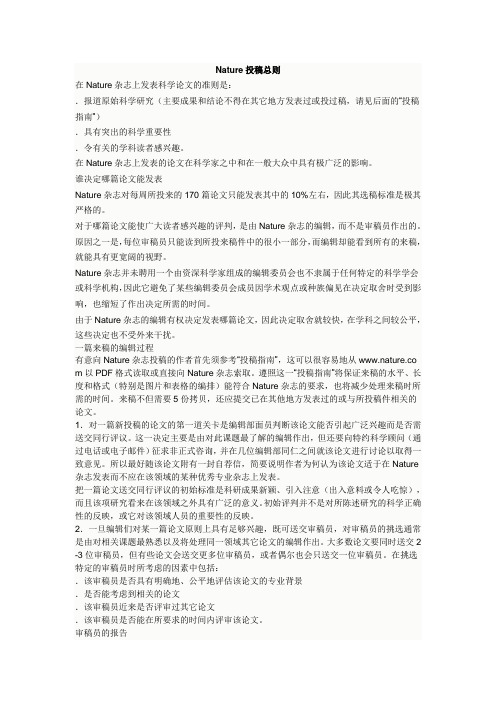
Nature投稿总则在Nature杂志上发表科学论文的准则是:.报道原始科学研究(主要成果和结论不得在其它地方发表过或投过稿,请见后面的“投稿指南”).具有突出的科学重要性.令有关的学科读者感兴趣。
在Nature杂志上发表的论文在科学家之中和在一般大众中具有极广泛的影响。
谁决定哪篇论文能发表Nature杂志对每周所投来的170篇论文只能发表其中的10%左右,因此其选稿标准是极其严格的。
对于哪篇论文能使广大读者感兴趣的评判,是由Nature杂志的编辑,而不是审稿员作出的。
原因之一是,每位审稿员只能读到所投来稿件中的很小一部分,而编辑却能看到所有的来稿,就能具有更宽阔的视野。
Nature杂志并未聘用一个由资深科学家组成的编辑委员会也不隶属于任何特定的科学学会或科学机构,因此它避免了某些编辑委员会成员因学术观点或种族偏见在决定取舍时受到影响,也缩短了作出决定所需的时间。
由于Nature杂志的编辑有权决定发表哪篇论文,因此决定取舍就较快,在学科之间较公平,这些决定也不受外来干扰。
一篇来稿的编辑过程有意向Nature杂志投稿的作者首先须参考“投稿指南”,这可以很容易地从www.nature.co m以PDF格式读取或直接向Nature杂志索取。
遵照这一“投稿指南”将保证来稿的水平、长度和格式(特别是图片和表格的编排)能符合Nature杂志的要求,也将减少处理来稿时所需的时间。
来稿不但需要5份拷贝,还应提交已在其他地方发表过的或与所投稿件相关的论文。
1.对一篇新投稿的论文的第一道关卡是编辑部面员判断该论文能否引起广泛兴趣而是否需送交同行评议。
这一决定主要是由对此课题最了解的编辑作出,但还要向特约科学顾问(通过电话或电子邮件)征求非正式咨询,并在几位编辑部同仁之间就该论文进行讨论以取得一致意见。
所以最好随该论文附有一封自荐信,简要说明作者为何认为该论文适于在Nature 杂志发表而不应在该领域的某种优秀专业杂志上发表。
- 1、下载文档前请自行甄别文档内容的完整性,平台不提供额外的编辑、内容补充、找答案等附加服务。
- 2、"仅部分预览"的文档,不可在线预览部分如存在完整性等问题,可反馈申请退款(可完整预览的文档不适用该条件!)。
- 3、如文档侵犯您的权益,请联系客服反馈,我们会尽快为您处理(人工客服工作时间:9:00-18:30)。
《Nature》系列期刊投稿指南1、《自然》系列期刊对作者的承诺(保证)《自然》系列期刊的编辑努力为作者提供高效、公正和充满关切的投稿、同行评议及发表经历。
作者期望被接受发表的投稿都是经过同行以最严格的专业标准进行过评审,他们也希望编辑是根据其提供深刻和有益分析的能力来挑选同行评审的专家。
编辑在选择《自然》期刊的内容需要权衡诸多因素,但他们会在尽可能保持最高决策质量的前提下努力减少做出决定的时间。
经过评审后,编辑会努力提高一篇论文的可读性,因此对读者来说,通过建议和对文章的编辑,所有的研究工作都将这样的形式呈现,即对领域内专家来说它是易读的,对直接领域外的科学家来说它是可以理解的。
通过我们的高级在线出版系统,研究工作会以在线开工发布而不被延误。
在每周举行的新闻发布会上,《自然》系列期刊为3000多位注册记者提供新闻,内容涉及到即将出版的所有研究论文。
大约80多万注册用户会通过电子邮件收到目录内容,在期刊的主页、目录页以及“新闻和观点”栏目中,许多论文都以“亮点方式”突出介绍以方便非专业读者阅读。
在所有的这些工作过程中,《自然》系列期刊的编辑坚守根据相关政策制定的编辑方针、伦理和科学标准,这些政策都刊登在我们期刊的网站上,我们也会周期性地评估这些政策以确保它们能持续地反映科学界的需求。
2、如何在《自然》系列期刊上发表您的研究工作《自然》系列期刊是由每周出版的多学科《自然》杂志和8种每月出版的期刊组成。
《自然》杂志发表在某一学科内具有高最影响、其它领域的科学家也会感兴趣的研究工作;8种学术期刊的名称是根据其报道领域命名的,它们都发表在其领域中质量最高、影响力显著的论文,这8种期刊的名称分别是:《自然生物技术》、《自然细胞生物学》、《自然遗传学》、《自然免疫学》、《自然材料学》、《自然医学》、《自然方法学》、《自然结构和分子生物学》(《自然》杂志的主页有它们的直接链接)。
所有的这些期刊都是国际性的,它们在美国、英国和日本出版和印刷。
点击这里可获得更多这些期刊间相互关系的信息。
《自然》杂志和《自然》系列月刊的影响因子位居世界影响因子最高的期刊之列。
每种期刊的影响因子都在可以其期刊的主页上找到。
期刊的崇高声望让作者受益良多,但也意味着论文发表的竞争异常激烈,因此有许多投稿未经同行评审就被拒绝。
《自然》系列期刊与绝大多数其它期刊的不同之处在于它们均没有编辑委员会,取而代之的是,论文是否出版是由具备深厚专业背景的编辑在与科学界作广泛的商议后决定的。
这篇文章只是为您提供这些非凡期刊的常规编辑过程。
虽然所有的期刊都基本相似且有共同的编辑方针(/npg/servlet/Content?data=xml/05_policies.xml&style=xml/05_policies.xs l),但所有的作者在投稿前都需要参考所投稿期刊的《读者指南》,以获得在该期刊准备和发表论文的至关重要的详细信息,因为期刊间存在差别。
3、编辑过程下面的部分概述了期刊的编辑过程,描述了编辑在投稿和发表过程中是怎样如何处理稿件的。
您可以通过进入在线投稿系统了解这一过程中的每一个步骤,并了解您的稿件的状态。
4、投稿前询问在将论文全文投稿前,研究人员也许可以从编辑处获得非正式的反馈信息。
这种服务的目的是节省您的时间――如果编辑认为论文不适合发表,您可以将论文及时投到其它期刊,而不被耽误。
如果您希望使用投稿前询问服务,请使用您选择的期刊的在线系统发送一段话,解释您的论文的重要性,以及论文的摘要或概述段和相关的引用目录,以便编辑能够将投稿与其它相关工作进行对比判断。
编辑也许会很快邀请您递交完整的论文(这并不意味着发表的任何承诺),或许告诉您这篇论文不适合在该期刊发表。
如果接到的是否定的回应,请不要回复。
如果您确信自己论文的重要性,那就不要在乎编辑的疑惑,您可以通过期刊的在线投稿系统递交论文的全文。
编辑会对您的工作做更详尽的评估。
5、初次投稿当您准备投稿时,请根据期刊的要求使用在线投稿系统。
当期刊收到您的投稿时,它会为您提供一个编号并安排一位编辑,这位编辑负责阅读论文,征询科学顾问和编辑部同事的非正式建议,并将您的投稿与本领域最近所发表的其它论文进行比较。
如果论文看起来新颖、引人注目,所描述的工作即很直接又有深远的意义,那么编辑会将论文送出去作同行评审,通常会送给两个或三个独立的专家。
然而,因为期刊只能在某一领域或次领域发表极少数的论文,因此许多论文未经同行评审就被拒绝,即使这些论文描述的可能是可靠的科学结果。
6、投稿在《自然》系列期刊间的转移在部分情况下,编辑不能发表您的论文,但他(或她)也许会建议说这篇论文更适合在其它的《自然》系列期刊上发表。
如果您愿意将论文重新投到所建议的期刊,那么您只需要简单地链接到编辑提供的网址,将您的论文和审稿意见转给新期刊。
这一过程全在您的掌握(控制)之中:您可以选择不使用这种服务,取而代之的是您可以使用期刊常用的在线投稿服务将论文投到其它的《自然》期刊或《自然》出版集团的期刊,而且如果您愿意,您可以选择在投稿中是否包含审稿人的意见。
7、同行评议当编辑决定将论文送出去评审时,他会给通讯作者发一封电子邮件告知这一信息。
编辑挑选的审稿人的依据是:独立性;对论文做出全面、公正的技术方面评价的能力;目前或最近是否评审过相关投稿;以及在规定的短时间内是否能对投稿做出评审等。
您也可为自己的论文推荐审稿人(包括详细的地址信息),只要他们是独立的科学家。
尽管编辑不一定会采纳这些信息,但这些信息常常是有用的。
编辑会考虑您的要求排除一定数量的指定姓名科学家作为审稿人。
8、决定和修订订后它又会怎么样地好。
在收到所有审稿人的意见后,编辑会在编辑之间讨论这份投稿,然后再给作者写信。
在这封信中,编辑或是拒绝发表您的论文,或是建议您修改后重投,或者说论文不需要进一步的修改就可发表。
如果编辑建议您修改论文,他或她会提供特别的建议,并在信中陈述这种修改是大改还是小改,以及是否会与审稿人进一步讨论您再投的修改稿件。
9、接受以后您的论文被接受以后,文件编辑(或副编辑)会对这篇论文做出版前的准备,他们会对文章进行推敲、润色,以便文字和图具有可读性,对直接领域外的读者来说也是清晰明白的,并且让论文符合期刊的风格。
文件编辑将为英语为非母语的作者提供建议,并且在编辑这些论文时特别小心。
10、出版后所有的论文都会在印刷版本的形式出版,在期刊的网站上以PDF和HTML格式全文刊登。
如果编辑和审稿人认为补充信息对于论文的结论至关重要(比如大的数据表格或有关一种方法的详细信息),而且许多专家对此的兴趣甚于论文的其它部分,那么补充信息将随同论文一同在电子网络版发表。
许多链接和导航服务会提供给《自然》系列期刊以在线形(HTML)出版的所有论文。
我们的新闻发布服务将包括所有论文和通讯作者的详细联系方式,这意味着您的工作会引起世界上所有主流媒体机构的关注,他们也许会选择在报纸或其它媒体中对您的工作进行特别报道。
部分论文会在《自然》杂志、《自然》出版集团的出版物和专门的网站上被突出介绍或概述。
《自然》出版集团出版的期刊不要求作者的版权,但是会要求您签署一份独家的出版许可文件。
这允许您可以在您自己或研究所的网站上以PDF格式刊登您的论文。
11、对决定的不同意见如果一位期刊的编辑不能发表一篇论文,也不建议再投稿,那么我们强烈建议您将论文发表在别的期刊上。
然而,如果您确信编辑或审稿人严重曲解您的论文,那么您可以给编辑写信,解释您认为该决定不正确的科学理由。
请记住编辑会优先处理最新的投稿和被邀请重投的稿件,因此会需要数周时间才能得到有关不同意见的回信。
在这一期间,您绝对不能将您的论文投到别处。
为了您的研究论文能够不被耽误地发表,我们因此建议如果您的论文被拒绝了您就将论文投交到别处,而不要将时间花在与编辑进一步的交流上。
(信息来源:/nature,图书馆叶爱菊老师收集整理,相关信息咨询电话:86914532)附:《Nature》系列期刊投稿指南(英文)Nature journal pledge to authorsEditors of the Nature journals strive to provide authors with an outstandingly efficient, fair and thoughtful submission, peer review and publishing experience. Authors can expect all manuscripts that are published to be scrutinized for peer-review with the utmost professional rigor and care by expert referees who are selected by the editors for their ability to provide incisive and useful analysis. Editors weigh many factors when choosing content for Nature journals, but they strive to minimize the time taken to make decisions about publication while maintaining the highest possible quality of that decision.After review, editors strive to increase a paper's readability, and thereby its audience, through advice and editing, so that all research is presented in a form that is both readable to those in the field and understandable to scientists outside the immediate discipline. Research is published online without delay through our advance online publication system. Nature journals provide more than 3,000 registered journalists with weekly press releases that mention all research papers to be published. About 800,000 registered users receive e-mailed tables of contents, and many papers are highlighted for the nonspecialist reader on the journal's homepage, contents pages and in News and Views.Throughout this process, the editors of Nature journals uphold editorial, ethical and scientific standards according to the policies outlined on our journal websites. We periodically review those policies to ensure that they continue to reflect the needs of the scientific community.How to publish your research in a Nature journalThe Nature journals comprise the weekly, multidisciplinary Nature, which publishes research of the highest influence within a discipline that will be of interest to scientists in other fields, and eight monthly titles, publishing papers of the highest quality and of exceptional impact in the disciplines indicated by their titles: Nature Biotechnology, Nature Chemical Biology, Nature Cell Biology, Nature Genetics, Nature Immunology, Nature Materials, Nature Medicine, Nature Methods, Nature Structural & Molecular Biology. All these journals are international, being published and printed inthe United States, the United Kingdom and Japan. See here for more information about the relationship between these journals.Nature and the Nature monthly journals have impact factors that are among the highest in the world. The impact factor for each journal can be found via its home page. The high prestige of these journals brings many rewards to their authors, but also means that competition for publication is severe, so many submissions have to be declined without peer-review.The Nature journals differ from most other journals in that they do not have editorial boards, but instead are run by professional editors who consult widely among the scientific community in making decisions about publication of papers. This article is to provide you with an overview of the general editorial processes of these unique journals. Although the journals are broadly similar and share editorial policies, all authors need to consult the Guide to Authors of the specific Nature journal before submitting, to obtain detailed information on criteria for publication and manuscript preparation for that journal, as some differences exist.EDITORIAL PROCESSThe following sections summarise the journals' editorial processes and describe how manuscripts are handled by editors between submission and publication. At all stages of the process, you can access the online submission system and find the status of your manuscript.Presubmission enquiriesResearchers may obtain informal feedback from editors before submitting the whole paper. This service is intended to save you time — if the editors feel it would not be suitable, you can submit the manuscript to another journal without delay. If you wish to use the presubmission enquiry service, please use the online system of the journal of your choice to send a paragraph explaining the importance of your paper, as well as the abstract or summary paragraph with its associated citation list so the editors may judge the paper in relation to other related work. The editors will quickly either invite you to submit the whole manuscript (which does not mean any commitment to publication), or will say that it is not suitable for the journal. If you receive a negative response, please do not reply. If you are convinced of the importance of your paper despite editors' reservations, you may submit the whole manuscript using the journal's online submission system. The editors can then make a more complete assessment of your work.Initial submissionWhen you are ready to submit the paper, please use the online submission system for the journal concerned. When the journal receives your manuscript, it will be assigned a number and an editor, who reads the paper, seeks informal advice from scientific advisors and editorial colleagues, and compares your submission to other recently published papers in the field. If the paper seems novel and arresting, and the work described has both immediate and far-reaching implications, the editor will send it out for peer-review, usually to two or three independent specialists. However, because the journals can publish only a very few of the papers in the field or subfield concerned, many papers have to be declined without peer-review even though they may describe solid scientific results.Transfers between Nature journalsIn some cases, an editor is unable to offer publication, but might suggest that the manuscript is more suitable for one of the other Nature journals. If you wish to resubmit your manuscript to the suggested journal, you can simply follow the link provided by the editor to transfer your manuscript and the reviewers' comments to the new journal. This process is entirely in your control: you canchoose not to use this service and instead to submit your manuscript to any other Nature or Nature Publishing Group journal, with or without including the reviewers' comments if you wish, using the journal's usual online submission service.Peer ReviewThe corresponding author is notified by e-mail when an editor decides to send a paper for review. The editors choose referees for their independence, ability to evaluate the technical aspects of the paper fully and fairly, whether they are currently or recently assessing related submissions, and whether they can review the manuscript within the short time requested.You may suggest referees for your paper (including address details), so long as they are independent scientists. These suggestions are often helpful, although they are not always followed. Editors will honour your requests to exclude a limited number of named scientists as reviewers. Decisions and RevisionsWhen making a decision about publication in the light of reviewers' comments, editors consider not only how good the paper is now, but also how good it might become after revision. When all the reviewers' comments have been received, the editors discuss a manuscript among themselves and then write to the author. In this letter, the editor will either decline to publish your paper, or suggest that you revise it for resubmission, or offer to publish it without further revision. If the editor suggests revising your paper, he or she will provide specific suggestions, will state in the letter whether the revisions are major or minor, and whether further consultation with referees is likely when you resubmit the revised version.If the editor invites you to revise your manuscript, you should include with your resubmitted version a new cover letter that includes a point-by-point response to the reviewers' and editors' comments, including an explanation of how you have altered your manuscript in response to these. After acceptanceYour accepted manuscript is prepared for publication by copy editors (subeditors), who refine it so that the text and figures are readable and clear to those outside the immediate field and the papers conform to house style. The copy editors will give advice to authors whose native language is not English, and will edit those papers with special care.After publicationAll papers are published in the print edition and, in PDF and HTML format, in the online edition of the journal, in full. Additional supplementary information is published with the online version of your paper if the editors and referees have judged that it is essential for the conclusions of the paper (for example, a large table of data or the extra details of a method) but of more specialist interest than the rest of the paper. Many linking and navigational services are provided with the online (HTML) version of all papers published by the Nature journals.All papers and contact details of corresponding authors are included in our press release service, which means that your work is drawn to the attention of all the main media organizations in the world, who may choose to feature the work in newspaper and other media reports. Some papers are summarized and highlighted within Nature and Nature Publishing Group publications and subject-specific websites.Journals published by Nature Publishing Group do not ask authors for copyright, but instead ask you to sign an exclusive publishing licence. This allows you to publish a PDF of your paper on your own or institution's website.Disagreements with decisionsIf a journal's editors are unable to offer publication of a manuscript and have not invited resubmission, you are strongly advised to submit your paper for publication elsewhere. However, if you believe that the editors or reviewers have seriously misunderstood your paper, you may write to the editors, explaining the scientific reasons why you believe the decision was incorrect. Please bear in mind that editors prioritise newly submitted manuscripts and manuscripts where resubmission has been invited, so it can take several weeks before letters of disagreement can be answered. During this time, you must not submit your manuscript elsewhere. In the interests of publishing your results without unnecessary delay, we therefore advise you to submit your paper elsewhere if it has been declined, rather than to spend time on corresponding further with the editors./nature。
